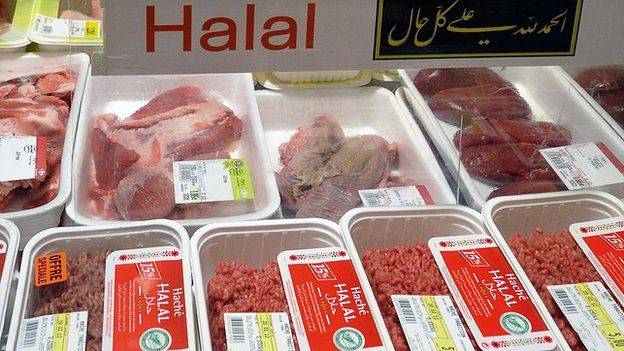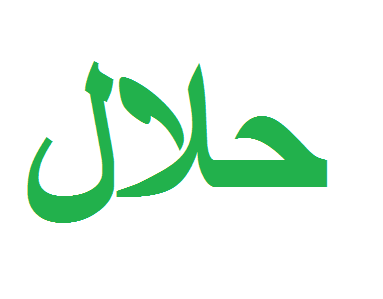Halal vs. Haram

You probably have heard the terms “
Halal” and “
Haram” at some point in your life, but you might not know what it means, what do Muslims eat and not eat and why. Here's a breakdown of what the term Halal means and what the term Haram means.
What is the difference between Halal and Haram
Halal and Haram are two Arabic words. They form an integral part of how Muslim view all aspects of life.
Halal: This is an Arabic word which means lawful or permissible. It does not just refer to things that a Muslim is allowed to eat but also encompasses everything lawful in a Muslim's life. Nevertheless, it is most often uttered in reference to food.
Haram: Haram is the Arabic word that is opposite to Halal; it means something is forbidden or unlawful for Muslims to consume, use or do.
Halal and Haram in the Qur'an
Here are some of the verses in the Qur'an which refers to Halal and haram, in particular to food:
In the words of Allah (SWT):
"O mankind! Eat of that which is lawful and wholesome, and follow not the footsteps of the devil. Lo! he is an avowed enemy of you." [Qur'an: 2:168]
"They ask you, [O Muhammad], what has been made lawful for them. Say, "Lawful for you are [all] good foods and [game caught by] what you have trained of hunting animals which you train as Allah has taught you. So eat of what they catch for you, and mention the name of Allah upon it, and fear Allah ." Indeed, Allah is swift in account." [Qur'an: 5:4]
"O messengers! Eat from what is good and lawful, and act righteously. Indeed, I fully know what you do." [Qur'an: 23:51]
What is Halal Meat

Picture Credit: BBC
You might have wondered what is a 'Halal' chicken, after all, all chickens look the same! So, what is it that makes this chicken, or beef, or mutton 'Halal' and others not? What exactly is the difference between Halal and non-Halal meat?
The answer is that it depends on the way that the animal is bought up, and how it is slaughtered.
Halal meat is the flesh of the animal that has been slaughtered in the way prescribed by Qur'an and Hadeeth; this method is called 'Zabihah'. This procedure was taught to Muslims as the best way to slaughter an animal in order to cause it the least amount of pain.
A few important criteria that must be followed in order to slaughter an animal in the Islamic way. They are as follows:
- The slaughter of the animal must be carried out by a Muslim.
- The animal must not be dead.
- Animals for slaughter must not be grouped together or allowed to watch the slaughter of other animals in their herd.
- As with most things Muslims do, it must begin with the utterance of 'Bismillah', which means 'In the name of Allah.
- The animal must be slaughtered with a precise cut to its throat, severing it's carotid artery, trachea and jugular veins.
- The slaughter must be carried out with the use of a razor-sharp knife to ensure a quick death and that the animal dies as quickly as possible.
- The animal must be hung upside down in order to allow all the blood to drain.
Find Halal Food and Restaurants Near You
Types of Halal Food
The general consensus is that everything that is not prohibited is Halal. We'll take a look at the types of Haram foods in more detail below, but for now, here's a list of the types of food that are considered Halal:
- Meat that is slaughtered in the Islamic manner
- Fish and other creatures of the sea (they need not be slaughtered)
- Fruits and vegetables
- Dairy products (barring cheese made using non-Halal rennet, etc.)
Types of Haram Foods
Here's a list of foods that are forbidden in Islam. To knowingly eat or drink any of them is a major sin unless it is an extreme case where no other food or drink is available and the person is in danger of starvation, or for medicinal purposes (granted there are no other alternates).
- Meat that is not slaughtered according to the methods prescribed by Qur’an and Hadeeth.
- Alcohol
- Pork or pork by-products
- Blood
- Food that may contain any combination of the above three (gelatin made from Haram meat, cakes with alcohol, etc.).
Delving further into the category of meat that is not Halal also considers the types of animals that one is not allowed to eat and the way in which the animal dies. These are the types of animals/meat that are Haram:
- Carnivorous animals/birds (animals that eat the flesh of other animals or drink their blood).
- Animals that have been dedicated to or slaughtered in the name of anyone other than Allah.
- Animals/birds that have been dedicated to idols.
- Animals/birds that have died due to natural causes.
- Animals/birds that die due to strangulation.
- Animals/birds that die from being beaten.
- Animals/birds that die falling down from a height.
- Animals/birds that are killed and gored by a beast of prey.
- Animals that live on both land and in water (amphibians) such as frogs and salamanders.
Why Do Muslims Eat Halal Food

Picture Credit: The Muslim Press
The reason that we Muslims only eat Halal meat is for two reasons: to make sure that we are putting into our bodies is healthy and clean, and to make sure that it has been slaughtered in the most humane way possible.
As we saw above, the Zabihah method of slaughter ensures that both of these criteria are met. It makes for a quick and efficient slaughter, and also focuses on bringing the animal up in a way that it is not mistreated. Animals that are bred for Islamic slaughter must be fed healthy fruits and vegetables (and nothing that is considered Haram for the regular Muslim), and clean. It must not be tortured or harmed in any way and be given enough space to roam, graze and get plenty of fresh air.
The list of Haram meat listed above follows these guidelines. Carnivorous animals will have non-Halal meat or blood in their digestive systems, and animals that have died from the various reasons described in the same list might have contracted some form of infection or diseases; therefore, they are prohibited.
When Muslims go out to eat, we look for assurance that the food is Halal. One reason is to make sure that the meat served has been slaughtered in the Islamic method, and the other is to be certain that the dish does not contain other types of Haram food (e.g. alcohol, pig's oil, etc.).
How To Identify Halal Foods

Eating something that is Haram knowingly is a major sin, and one that every Muslim should refrain from. Allah has provided us with such bountiful foods, and there is so much that we can enjoy, so we must make sure to stay away from that which is considered unlawful. It is also a sin if you neglect to find out whether the food is Halal or not, and it is best to stay away from foods that you are unsure of.
Here are a few ways to identify Halal foods in your country:
- Packaged Halal foods often carry a “Halal Certified” logo awarded by the Muslim council or Halal supervisory board of your country.
- Some foods simply have the word “Halal” printed on them; this is fine too, but be careful in considering whether you are able to trust the source.
- If there is no Halal symbol, look for the vegetarian sign. This is the one that looks like a green square with a green dot in the middle. Check the ingredients to make sure it doesn't contain alcohol (most packaged goods will not), and you're good to go.
- Always check the labels. Checking the ingredients listed on the package is your best bet on figuring out if the food is Halal or not.
- In the case of confectioneries, look out for “gelatin” listed in the ingredients. If the package has no Halal or vegetarian symbol, then it's most probably not Halal gelatin.
- Some foods containing the non-vegetarian symbol, which looks similar to the vegetarian symbol but maroon in colour, can also be Halal. This may be because it contains eggs, and since there are no Halal and Haram eggs, there is no need to worry. If this is the case, it is usually mentioned underneath the maroon square and circle symbol.
- Check for foods containing emulsifiers. Look for Halal and Haram E-Codes online, or you can even download apps that scan the ingredients and tell you if it's Halal or not. But many emulsifiers may be derived from plant or animal sources (maybe Halal or non-Halal), so not all products will be the Halal or Haram.
- Nevertheless, here are a few of the Haram E-Codes to look out for:
- - E120 Cochineal: red colouring derived from female insects.
- - E441 Gelatine: derived from the bones/hides of cattle/sheep.
- - E542 Edible Bone Phosphate: extracted from animal bones.
- - E904 Shellac: a resin from the lac insect.
- If you are eating at a restaurant that claims to be Halal certified, insist on seeing their certification.
- If they do not have one, they will tell you that they source the meat from Halal suppliers and do not serve pork or alcohol. In this case, ask to see the certification of their meat supplier.
- Refrain from eating, even vegetarian dishes, from restaurants that serve dishes that contain alcohol, non-Halal meat or pork. This is because they probably use the same utensils to cook both dishes, and it is quite possible that there is cross-contamination even if the dishes have been washed.
- Some restaurants serve alcohol on the side. If everything else checks out, this is fine, but if there are other options, it would be better to go for them.
- If you're looking to buy Halal meat, local Muslim-owned butcheries are the ideal place for them.
- Muslim-owned restaurants also are credible, but if it is a chain restaurant, check their certifications before eating there.
Share your Halal dining experience.







Jofra291
Choose from our range of delicious halal-certified meat collections and have a chilled box of meats delivered direct to your door. All fresh meats hand cut by our own Master Butchers and dispatched to your home. The finest meats perfect for you to concoct scrumptious meals for the entire family. Select below from our collection of halal meat boxes based on your requirements. halal food box